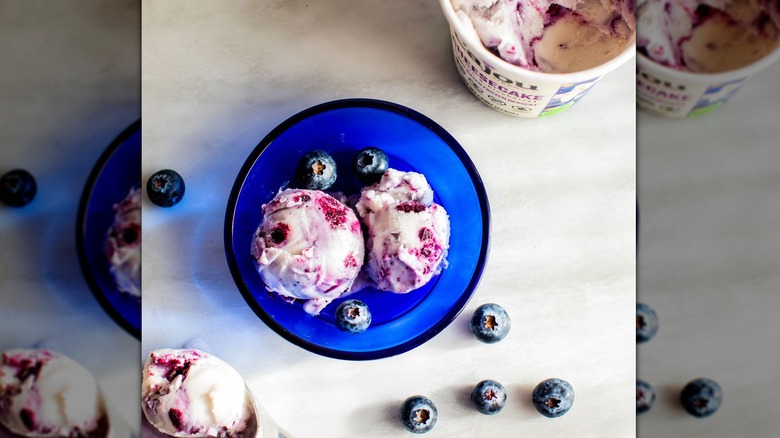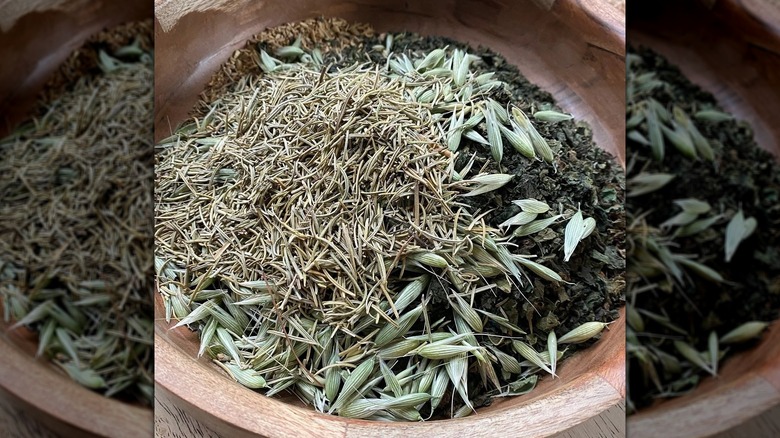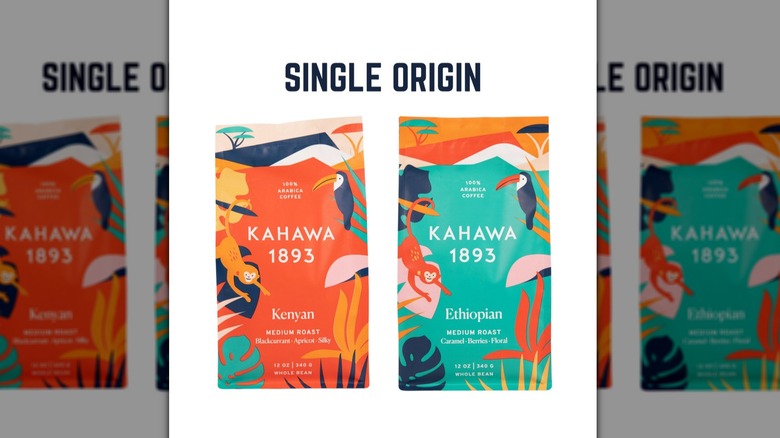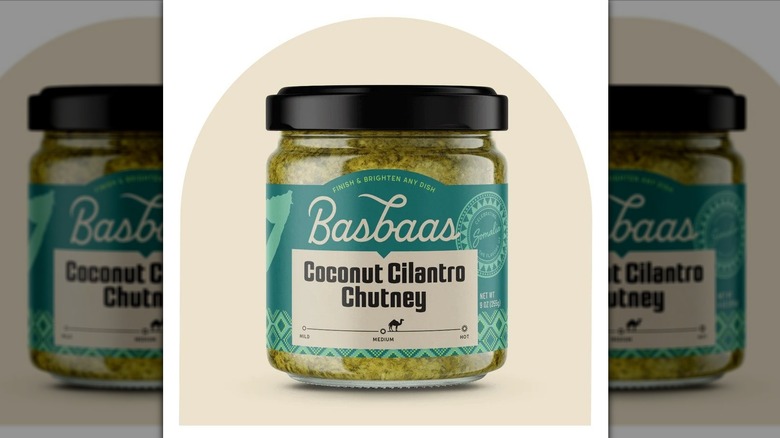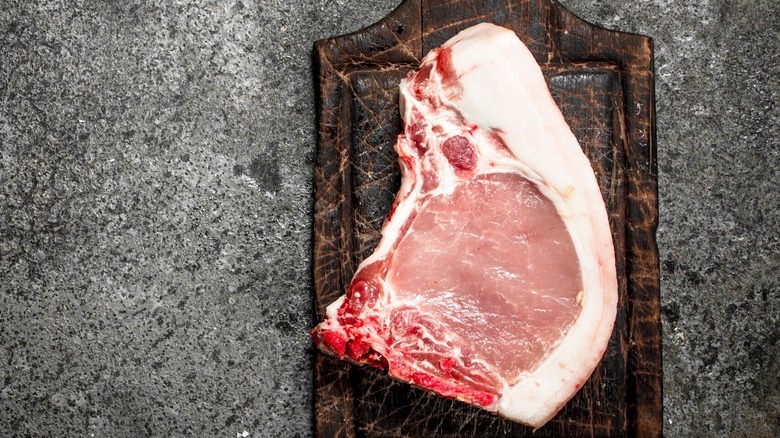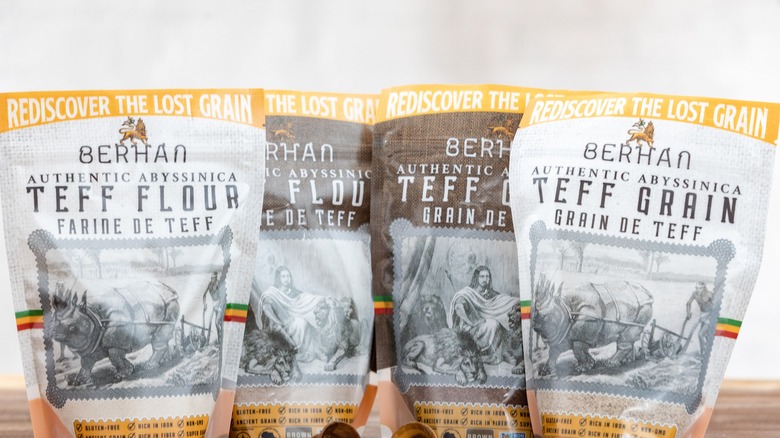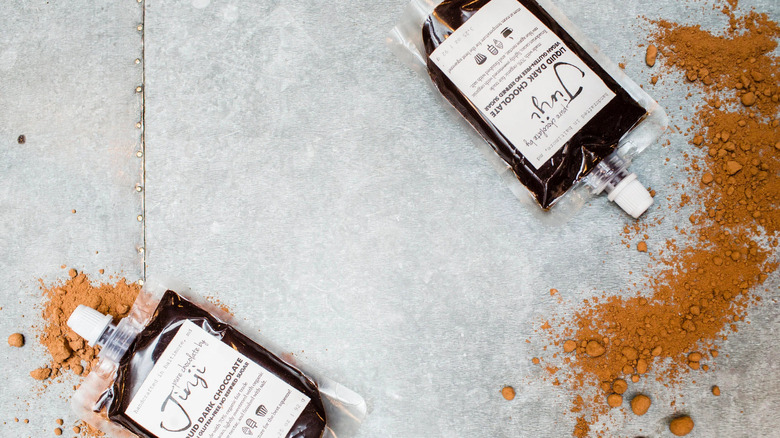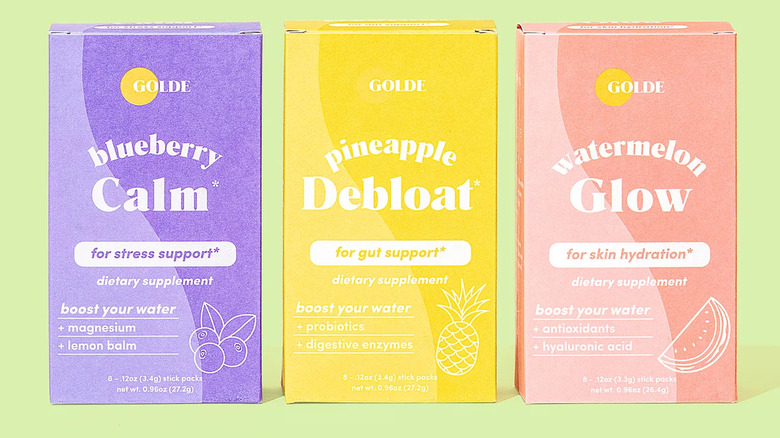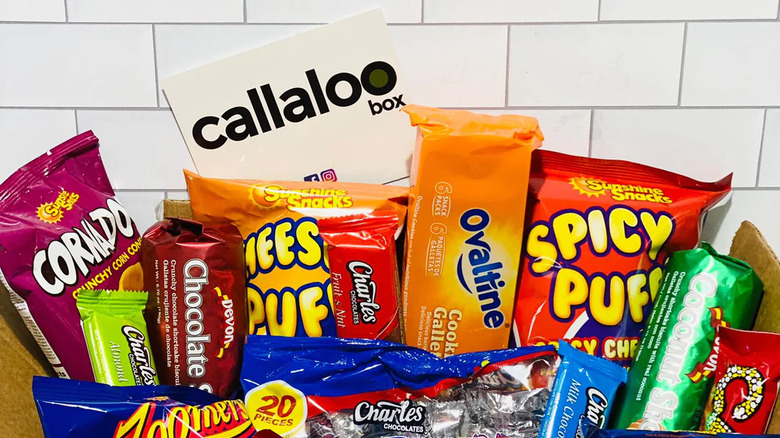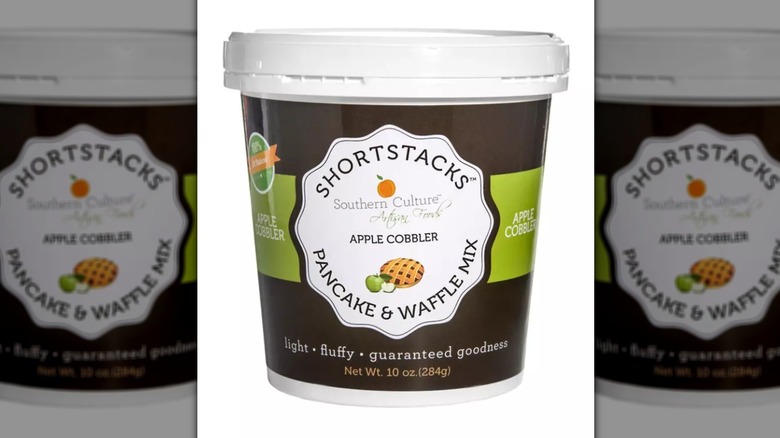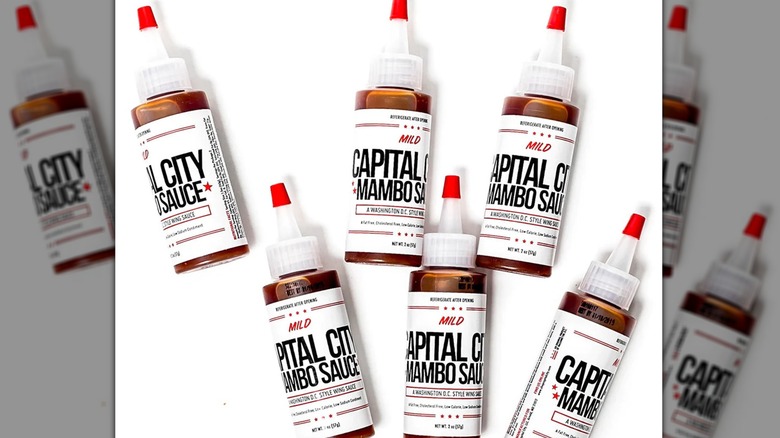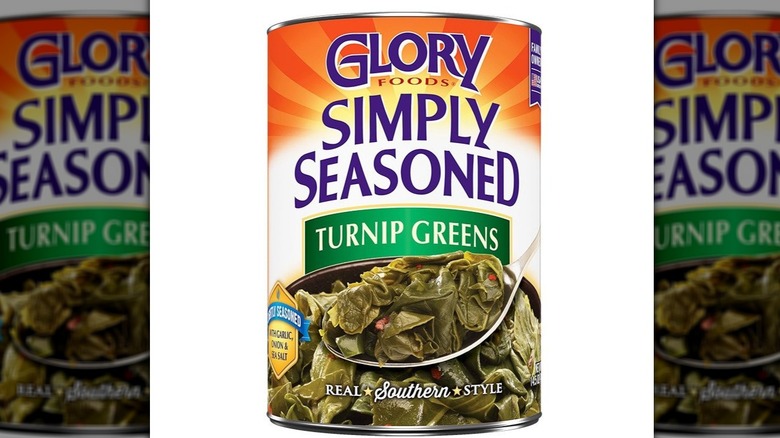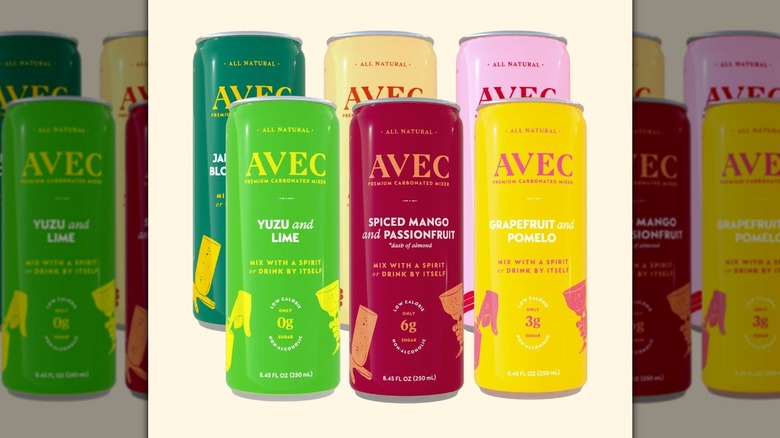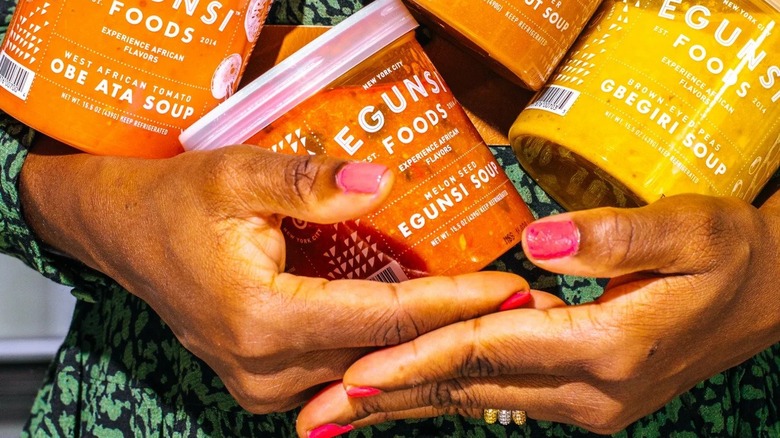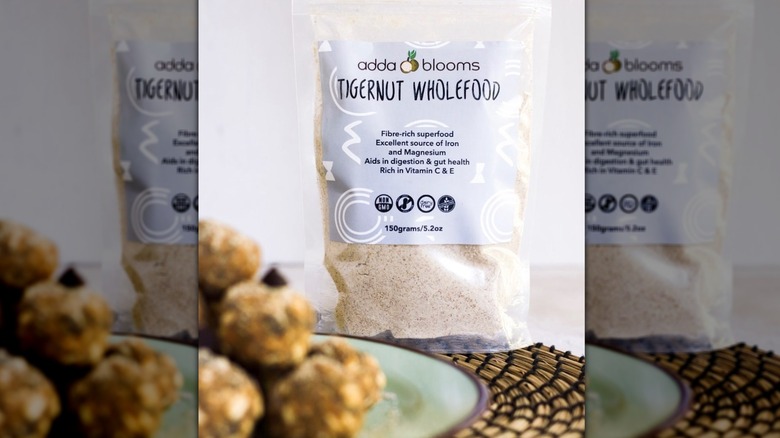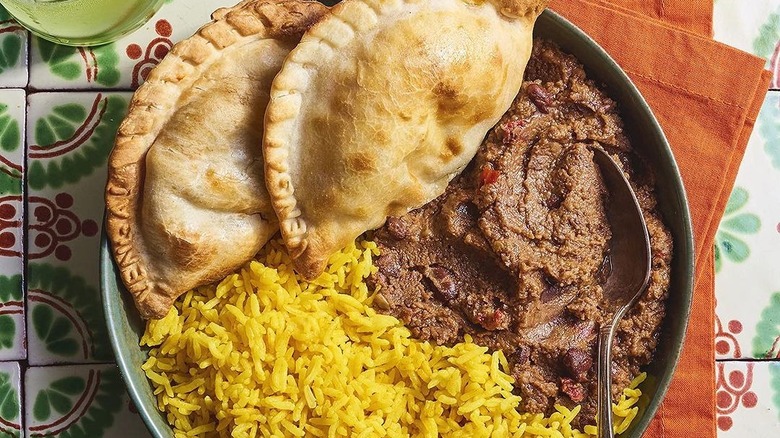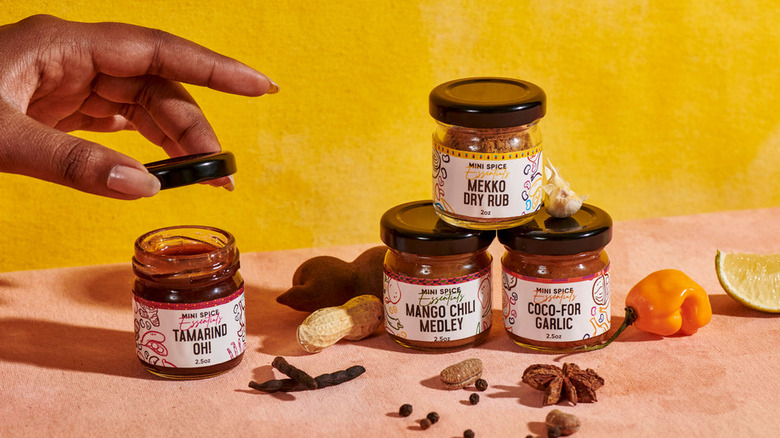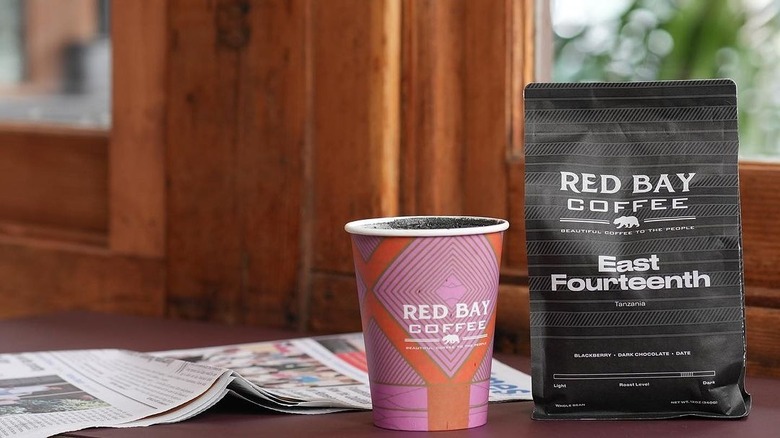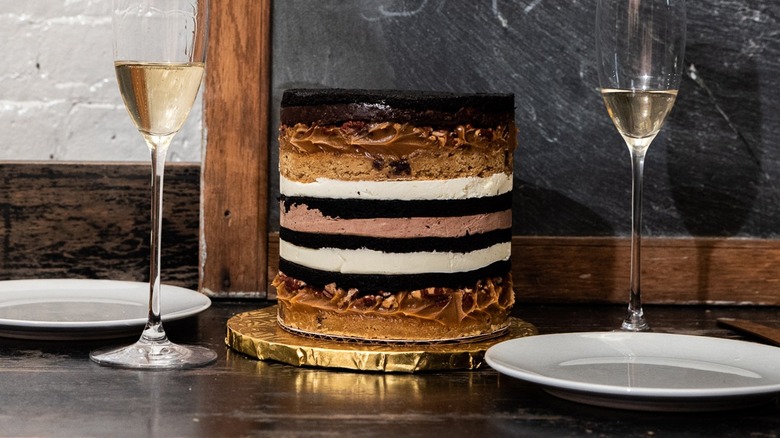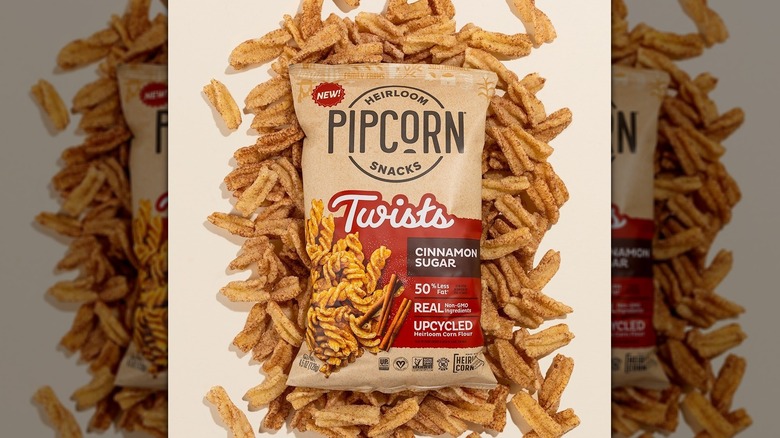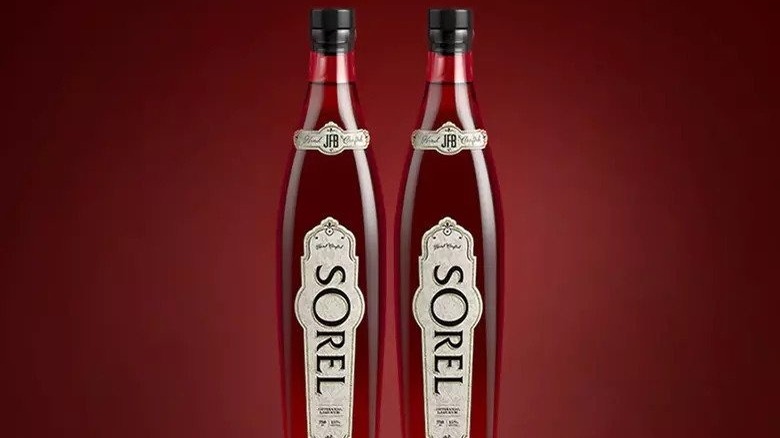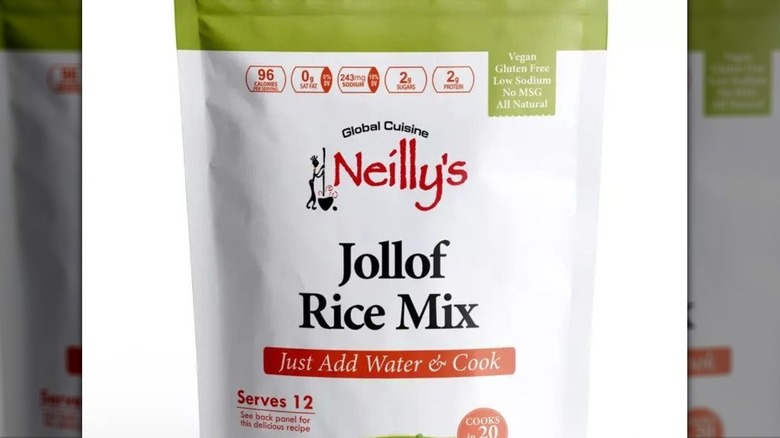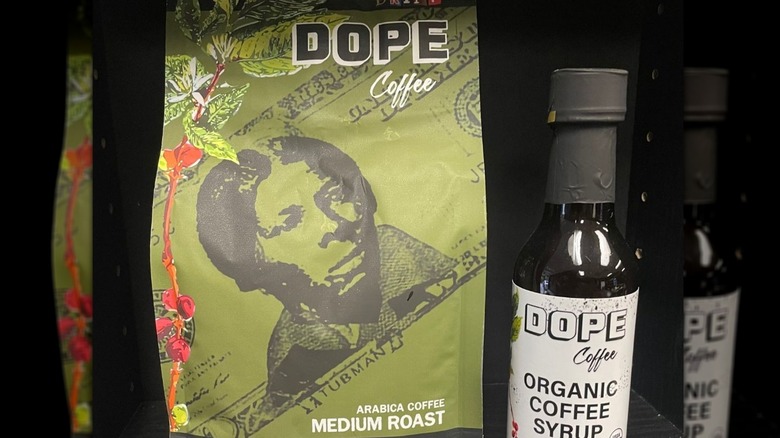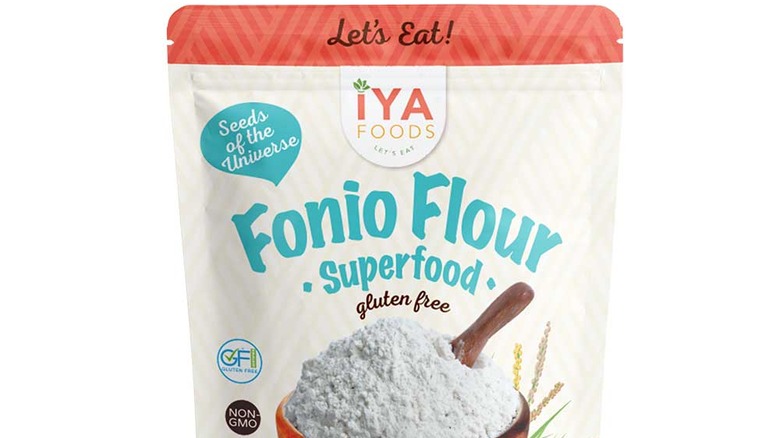25 Black-Owned Food Brands That Should Be On Your Radar
Making a name in the highly competitive food industry can be nearly impossible, and it seems like everyone has their own jar of sauce or premium spirit these days. But one thing is certain: These Black-owned food brands are on the rise and worth checking out. From ice cream to herbal tea to spice mixes that bring the flavors of Africa right into your kitchen, these food brands have something for everyone; every company on this list makes it their goal to bring a personal touch to your cooking.
Even better? Many of these Black brands are investing their time, energy, and profits back into their communities, pairing good food with good deeds. These philanthropic companies build giving into their bottom line. This may look like community investment in job training, mentoring young entrepreneurs, or donating money to worthy local causes. Now more than ever, these Black brands are lifting others up as they climb, and that's something worth supporting.
Cajou Creamery
Cajou Creamery (Kah-jū) is the first ice cream shop in D.C., Baltimore, and Virginia (a region known as the DMV) that uses exclusively plant-based milk for its rich, creamy concoctions. Founded by husband and wife duo Nicole Foster and Dwight Campbell with the idea that ice cream could be made healthier in small batches using superfoods, the delicious cashew and almond milk ice cream comes in delectable flavors from around the globe, including Horchata, Baclava, and Mexican Cacao. The ingredient list is short, responsibly sourced, and free from soy and gluten.
Ice cream is shipped nationwide, hand-packed in a cooler with dry ice. Join the Cajou Club and get discounts on pints, plus early access to special and seasonal flavors.
Eudemonia Herbs
Brittany Williams started Eudemonia Herbs as a way to combine her deep understanding of herbal medicine with practical applications for everyday life. The word "eudemonia" means happiness or flourishing, and Williams uses her small, family-run shop to help people in the community do just that.
Williams grows, sources, and handcrafts small-batch herbal tea blends that promote health and wellness, but the magic goes well beyond that. She also uses her nearly three decades of work with herbs to craft puff puffs (herbal smokes), tinctures, and body care formulations designed to bring balance into people's lives. For those living in and around Baltimore, Williams offers in-person classes on everything from herbal remedies for children to crafting herbal cocktails.
Kahawa 1893
"Powered by women from crop to cup," Kahawa 1893's slogan highlights the fact that these small-batch coffees are cultivated on women-owned farms in Kenya, Rwanda, and Congo. Founded by Margaret Nyamumbo, Kahawa 1893 takes its name from the Swahili word for coffee (kahawa). It traces its roots back to 1893 when coffee returned to Africa via tiny seedlings planted by Nyamumbo's grandfather.
Growing up, Nyamumbo watched as women labored over the crops in her community while owning less than 1% of the land they worked on. After attending college in the U.S., she returned to Kenya and decided to bring single-origin coffee grown on farms owned by women to people across the globe. Her commitment and experience as a third-generation coffee farmer caught the eye of Emma Grede on "Shark Tank." Grede provided funding that helped Kahawa expand across the U.S. in stores like Trader Joe's and Sprouts. Shop online for gift baskets, single-serve bags, and coffee by the pound.
Basbaas Foods
If you like a bit of spice, a tangy sweetness, or a straight-up burst of flavor in your sauces and condiments, Basbaas Foods is here to serve. Inspired by the flavors of her home country of Somalia, Hassan designed each sauce and condiment to hit all the flavor notes of Africa: a little sweet, a little spicy, and a little salty. Including a hint of acid and finished with fresh herbs, peppers, and dried fruit, each plant-based condiment is easy to use and an excellent addition to any kitchen.
Hassan is also the author of "In Bibi's Kitchen." This book is named for grandmothers — bibis — who share their stories and recipes from the eight African countries that line up along the Indian Ocean.
Warrior Creek Premium Meats
According to a study by the U.S. Department of Agriculture, Black farmers in the U.S. lost over $325 billion acres of land in the 20th century. Today, only .5% of all farmland in the U.S. is owned by Black farmers, which is just one reason that Warrior Creek Farms stands out. This 72-year-old family farm rests on the banks of Warrior Creek in Pulan, Georgia, but the farmers who work it are anything but relaxed. Their mission is to build relationships in their community and beyond by participating in farming practices that focus on the humane treatment of animals.
This ethical treatment includes growing non-GMO corn to feed the livestock, but it is so much more. The Dollisons running Warrior Creek today — father and daughter Ricky Dollison Sr. and Leiandra Dollison — are the fourth and fifth generation on the farm, respectively, to bring premium quality pork products to market. Try a sample box of meats, or pick up a pack of the meat that started it all: premium sausage links, patties, and pan sausage.
Berhan Grains
Grains are a staple ingredient for billions of people across the globe, and Berhan Grains is a company doing its part to feed the world with one nutritionally-charged option. The brand specializes in teff, the world's tiniest grain and one of the first to be domesticated in Ethiopia. Teff is naturally gluten-free and is high in iron, calcium, protein, vitamin C, and more.
Injeera bread is traditionally made with teff, but Berhan Grains has plenty of suggestions for ways to use it for more than that. Cook up the whole grain for use in grain bowls or as a rice alternative, or opt for the milled variety. Not sure how to cook teff? Start with one of Berhan's pancake and waffle mixes. The brand offers plain, cocoa, and chai varieties.
Pure Chocolate by Jinji
In 2012, Jinji Fraser and her father, Guy, set out to create chocolate that is not only delicious but also respectful, paying homage to the earth that produces the cacao, the farmers who tend the plants, and the stories that each confection generates. Today, Jinji sells handcrafted chocolates free from dairy, refined sugars, and gluten online and from a new storefront in the Waverly neighborhood of Baltimore.
Pure Chocolate by Jinji offers a set menu of chocolates, including favorites like gianduja, chocolate-covered coffee beans, and liquid dark chocolate for decadent baking. Jinji also produces weekly and seasonal specialties that take advantage of local ingredients. Some recent favorites include truffles in flavors like blueberry pancake, hibiscus, and strawberry shortcake. The flavor profile of Jinji's chocolates is always complex, earthy, and redolent of the farms from which they come.
Golde
Golde is a health and beauty supplement brand that promotes glowing skin that starts from the inside. Launched from a Brooklyn apartment in 2017 by founder Trinity Mouzon Wofford, with a single product, the Original Turmeric Latte Blend, Golde has expanded to everything from subscription kits to single purchases of its signature matcha and other superfood blends.
This company aims to make wellness accessible and integral to its clients' everyday lives. Wofford believes that self-care is how a person becomes their best self, and she wants to provide a product experience that doesn't mean upending your entire life. Golde sells single-serve powders and blends that can be easily whisked into a morning smoothie for optimal nutrition and health. Choose your focus — detoxing, calming, or glowing skin — and sip away.
Callaloo Box
Trying new cuisines can be intimidating. If you have no idea what the food is supposed to taste like (or you aren't a big fan of cooking in the first place), where do you start? If you want to start with snacks, Callaloo Box has you covered. This delivery service, founded by sisters Malika and Jamila from Trinidad and Tobago, brings a taste of the Caribbean to your doorstep.
Order a box in sizes that range from mini to mega, filled with your favorite salty, sweet, and spicy snacks. You can customize the type of snack you prefer, or let the sisters curate a box for you.
Also available are single purchases of traditional Trinidadian and Tobagan snacks like channa peanuts, split peas, and preserved red mangos. Shop by snack type or brand and earn loyalty points that count towards dollars off future purchases every time you buy.
Southern Culture Kitchen
Erica Barrett founded Southern Culture Kitchen when she walked empty-handed out of a grocery store, frustrated by how much it cost to make a simple breakfast with quality ingredients for her family. What started out of frustration grew into a brand that now offers delicious pancake mixes, maple syrups, cornbread mixes, and savory options such as bacon rub, grits, and fried chicken seasoning.
And when Barrett appeared on Shark Tank in 2014, Barbara Corcoran bit, investing in the company and helping push it further along its culinary path. Today, Southern Culture Kitchen has expanded its breakfast mix flavor options and even offers gluten-free varieties.
Capital City Co
When Charles and Arsha Jones moved from Washington, D.C. to a suburb, they missed the flavors that could only be found in their favorite D.C. restaurants. They also knew that D.C. natives struggled to find these same flavors outside the Beltway. So in 2001, they founded Capital City Co, a family-run enterprise specializing in sweet, tangy Mambo Sauce.
Mambo Sauce is available in the original mild version, but adventurous customers are lining up for the sweet hot version, too. Both are sold in a six-pack of minis, 12-ounce bottles, or gallon jugs for when it's really time to party.
Glory Foods
Glory Foods was founded by Bill Williams in 1989 to bring the taste of Southern comfort food to homes and restaurants. Also, 80% of the fruits and vegetables in its products come from farms within 150 miles of the Glory Foods processing plant. This means that the flavor and nutrition are optimal when packed. Today, Glory Foods employs farmers all across South Carolina, each committed to producing and packaging beautifully seasoned, healthy canned, and fresh vegetables prepared in the Southern style for families across the U.S.
In 2010, Glory Foods was acquired by McCall Farms, a packer that worked with them for 20 years. Even with this change, the original family is still a part of the company: Bill Williams Jr. remains the Director of Sales, ensuring that the legacy and commitment to quality continues.
Avec Drinks
Avec Drinks founders Alex and Dee understand the power of connection over a well-mixed cocktail. But that power diminishes significantly when you dive into the sordid ingredient list on the back of many standard drink mixers. Most include sugar, preservatives, and additives that aren't good for you (and don't taste great either). Alex and Dee set out to make a better line of drink mixers with 100% real ingredients, no preservatives, and minimal sugar.
Mixers feature flavors like jalapeño and blood orange and yuzu and lime, each sweetened with natural juice. Order a sampler to taste their six flavors, or customize a 12-pack with your favorites.
Egunsifoods
Necessity might be the mother of invention, but homesickness is a significant driver behind many of the Black-owned food brands on this list. Egunsifoods is no exception. Nigerian-born Yemisi missed the foods and flavors of her childhood and struggled to recreate them in her home in New York. She wanted to share her favorite dishes with friends, but it was time-consuming and challenging. This led her to found Egunsifoods in 2017, a brand specializing in ready-made soups and sauces with flavors from West Africa.
Choose from individual soups in meat- and plant-based varieties, or pick up a four-pack of red pepper sauce to slather on everything. Subscribe for a monthly delivery, or opt for a larger family pack to feed a crowd.
Adda Blooms
In 2017, the founder of Adda Booms, Abena Offeh-Gyimah, visited Ghana and wondered at the loss of indigenous plant life and the destruction of the food system there. She began to work with small farming collectives, individual farmers, and farming cooperatives to bring ancestral grains to the market, creating Egunsifoods. The motivation was to encourage the continued production of these plant-based grains and to expose the world to their nutrition and flavor.
Choose from products such as indigenous African rice, fonio, or tiger nut flour. Or stock your pantry with an ancestral kit that includes four different grains (or a smaller kit with just two). Each grain is gluten-free and exported directly from Africa.
A Dozen Cousins
Inspired by his daughter, her 11 cousins, and the chaotic, joyful meals they shared in their extended family, the founder of A Dozen Cousins, Ibraheem Basir, set out to create a food brand with strong Creole, Caribbean, and Latin American flavors. This company provides a wide variety of rice, beans, and sauces to make delicious food whenever you gather.
But A Dozen Cousins is also on a mission to help others in the community. The brand's annual social impact grant provides money to non-profit organizations working to bring parity in health across socioeconomic levels. Among other things, these grants have funded organizations that promote better access to healthy food resources, provide birthing support for people of color, and work to educate previously underserved communities.
EssieSpice
If your cooking lacks a little zest, EssieSpice is here to save the day. The company's namesake spent her childhood in Ghana at her mother's feet, playing with pots and pans in the kitchen while luscious aromas wafted around her. Essie Bartels chased those flavors all across the globe, melding the tastes of her mother's kitchen with other world cuisines to create spices, dry rubs, and sauces bursting with flavor. Explore spices one at a time, or pick up a bundle to expand your cooking vocabulary.
Through all of her journeys, EssieSpice continues to give back. Spices are sourced directly from Ghanaian farmers to support their family farms. In addition, EssieSpice supports the Tarkwa Bremen Girls School in Ghana. These contributions have provided free tuition and meals for students for five years.
Red Bay Coffee
From the start, Red Bay Coffee knew it wanted to be different. Keba Konte founded the business in 2014 at the beginning of what he considers the "fourth wave" of coffee: An upswelling of sustainable coffee production that focuses on community, diversity, inclusion, and equity. It's not just about coffee — Red Bay utilizes this caffeinated vehicle to drive a movement towards expanded entrepreneurship and social and economic restoration in communities where equity has been absent in the past.
Red Bay prioritizes hiring practices that are more inclusive, gathering up those traditionally left out of this industry: returning citizens, women, people with disabilities, and people of color. It offers subscription packages, single-serve coffee packs, canned cold brew, coffee-making gear, and other merch to make your morning cuppa perfect.
Blondery
For special occasions, everyday snacking, and all events in between, the Blondery is the place to get luscious brownies, blondies, stacked layer cakes, and other delicious baked goods. Auzerais Bellamy has the street cred and education of a five-star pastry chef, training in the pastry arts in culinary school in both Rhode Island and France. An earthquake on the West Coast sent her back east, where she started baking sweet treats to send home to friends and family who missed her signature blondie.
From there, it was a short hop to opening the Blondery in Peekskill, New York. The bakery still bakes and ships nationwide, but lucky locals can walk in and get a taste of blondies, brownies, cake jars, and sometimes even cupcakes.
Pipcorn
As with many brands on this list, Pipcorn's story starts with family. Brother and sister team Jeff and Jen Martin were moving when they found a bag of popcorn left over from a trip to a health food store. Needing a quick snack, they popped it up, and their story began. The popcorn was an heirloom variety with an exceptional flavor packed into a tiny kernel. They found the farmer responsible for the heirloom popcorn, and Pipcorn was founded.
Pipcorn was well on its way before its appearance on "Shark Tank," where Barbara Corcoran hopped aboard and provided the siblings with an investment to help them power their brand to wider distribution. Today, Pipcorn has expanded from simple popped corn to other non-GMO snacks like cheese balls and crunchy twists.
Sorel Liqueur
Sorel Liqueur has a history and tradition as rich as the continent from which it sprung. An alcoholic version of the ancestral red drink, this rich blended liqueur starts with the vibrant crimson of the Moroccan hibiscus. It follows with cloves from Brazil, cassia from Indonesia, and ginger from Nigeria. The result is an award-winning liqueur that carries the tradition of the African diaspora forward.
Founder Jack Summers was the first Black man to be granted a license to manufacture liquor in the U.S. after prohibition, and no other Black person held a license when he launched his first micro-distillery in 2012. He left a career in the corporate world to create this spirit, which can be enjoyed over ice or mixed.
Neilly's Foods
Albert and Julie Ndjee missed their native cuisine of Cameroon. They found a wealth of other culinary options from Europe, but the flavors of Central Africa were nowhere to be found. Those few products on the shelves of specialty stores? These were packed with artificial ingredients, dyes, and fillers. So they decided to create their own favorites, refining the recipes as they shared them with family and friends. Neilly's Foods was only available in local farmer's markets until the Ndjees could finally leave their full-time jobs and devote themselves to bringing the flavors of Africa and the Caribbean to tables across the U.S.
Neilly's offers staples like quick-cooking rice mixes, premium plain rice, beans, and sauces. Just add water and bring the authentic flavors of Africa to your table, with no artificial ingredients, flavors, or added preservatives.
Dope Coffee
Another Black-owned coffee brand doing good for the culture while brewing an incredible cup of coffee is Dope Coffee. The CEO and founder, Michael Loyd, has a vision of coffee that is inclusive and diverse. To that end, he wanted to create a company that supports his mission of lifting up impoverished communities, like the one in which he was raised, with his example of entrepreneurship and focus on community-building.
Dope Coffee's latest outpost in Decatur, Georgia, features a tasting room, roastery, and a basketball court and space to hang out. In addition to roasted beans, Dope Coffee is also a purveyor of ready-to-drink coffee beverages, coffee-making gear, and skin care items tailored to people of color.
Iya Foods
The mission of Iya Foods is straightforward: It wants people to feel the love from each product it makes. Iya Foods sells nourishing African superfoods such as fonio, tiger nut, and cassava, grown by small farms in Africa. Sourcing directly from these farmers means more money stays in the community where the products were grown.
Toyin Kolawolem, the founder of Iya, grew up with an entrepreneurial spirit, assisting her parents in Nigeria. She moved to the U.S. in 2003 to pursue an MBA and started Iya Foods in 2015. It was a way to combine her business skills with her desire to incorporate ancestral African foods and flavors into everyday cooking. Today, Iya Foods is a trusted purveyor of flour, flour blends, spice mixes, hibiscus and whole food powders, and gluten-free baking mixes.
Fou-Dre Vodka
Another ultra-premium liquor brand is rounding out the list of Black-owned brands to try: Fou-Dre Vodka. Fou-Dre (pronounced foo-dray) means lightning, a name that's reflected in its striking signature bottle. Infused with fruit flavors in an easy sip, this spirit has won multiple tasting awards since it was first bottled in 2009.
As a Black woman in a male-dominated industry, founder Chanel Turner turned heads when she founded Fou-Dre Vodka in 2009 at the age of 25. Since then, her continued commitment to quality shows in her use of non-GMO corn and a patented process that infuses fruit flavor during distillation instead of adding it at the end. This attention to the smallest details makes this brand one to watch.

